|
|
|
Sort Order |
|
|
|
Items / Page
|
|
|
|
|
|
|
| Srl | Item |
| 1 |
ID:
080292
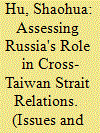

|
|
|
| 2 |
ID:
080295
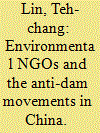

|
|
|
|
|
| Publication |
2007.
|
| Summary/Abstract |
The nature of state-society relations in China has been undergoing a process
of change over the past few decades. It is a process that cannot be obscured, in
which the state and society are incessantly shaping and reshaping their relations. In
the wake of market-oriented reforms, and due to the emergence of environmental
non-governmental organizations (NGOs), the Chinese state has also gradually opened
up to the international community, allowing the linkages between international and
domestic NGOs to be enhanced, and this has further transformed state-society
relations in China. Focusing on the development of environmental NGOs, this
article provides insights into China's changing state-society relations and explores the
key factors that greatly facilitate the transformation of these relations. The anti-dam
movements, which have developed in reaction to the Three Gorges Dam and the
Nujiang project, as well as the issues of resettlement and environmental protection
associated with the dam construction, have caused a new wave of interaction between
the state and society and resulted in a new social movement with Chinese
characteristics
|
|
|
|
|
|
|
|
|
|
|
|
|
|
|
|
| 3 |
ID:
080293
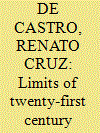

|
|
|
|
|
| Publication |
2007.
|
| Summary/Abstract |
This article examines how China's soft-power diplomacy has dramatically
improved Philippine-China relations, a scenario unthinkable ten years ago. Since
2005, the two countries have significantly increased bilateral trade and investment
relations as well as conducted close and intense security cooperation. Such
developments in bilateral relations have been initiated by China to serve its changing
strategic interests in Southeast Asia. Arguably, the general improvement in
Philippine-China bilateral relations is part and parcel of China's efforts to shape
Southeast Asia's view of its emergence and to apply soft power to erode American
strategic preponderance and influence in the region. However, despite its growing
economic and political ties with Beijing, Manila has not totally succumbed to China's
soft-power diplomacy. Instead of jumping on the Chinese bandwagon, the
Philippines continues to foster closer political/security ties with the United States and
Japan to balance China's growing political and economic clout in Southeast Asia
|
|
|
|
|
|
|
|
|
|
|
|
|
|
|
|
| 4 |
ID:
080291


|
|
|
| 5 |
ID:
080294
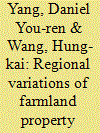

|
|
|
|
|
| Publication |
2007.
|
| Summary/Abstract |
This article explores the divergent patterns of farmland property rights
transformation in Suzhou and Dongguan, China, and investigates the relevant factors
influencing this divergence from an institutionalist perspective. We point out that a
local property rights regime based on the collective ownership system coupled with
developmental dynamics at village level has made the transformation of farmland
property rights in Dongguan different from that in Suzhou. We also discover some
emerging local institutions that may have been factors in the variation of farmland
property rights transformation between these two regions. Furthermore, we observe
that such spatial-institutional variation influences the welfare of local farmers to a
significant degree. Finally, this study suggests that in addition to the "economic
paradigm," scholars might pay more attention to political factors such as intra-Party
promotion/evaluation systems, the tensions between the evaluative indicators systems
maintained by the tiao (central/local sectoral command) and the kuai (territorial
jurisdictions), and the regulation as well as political governance of
government-village relations in order to further understand the dynamics and
contradictions of China's local development.
|
|
|
|
|
|
|
|
|
|
|
|
|
|
|
|
| 6 |
ID:
080296
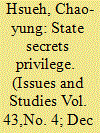

|
|
|
|
|
| Publication |
2007.
|
| Summary/Abstract |
On January 25, 2007, for the first time in Taiwan's history, President Chen
Shui-bian filed a request for a constitutional interpretation and invoked the state
secrets privilege in an attempt to shield the first lady from a corruption trial. The
interpretation sparked a national uproar and many in the media voiced criticism of the
president. The controversy centered on the assertion by the grand justices that the
president enjoys "special privilege over state secrets," and that he alone can decide
what is a state secret. Some argued that this is a "super umbrella" of protection
tailored for the president, which may lead to the creation of a dictatorship and allow a
ruler to cheat the people in the name of "protecting national secrets."
The state secrets privilege has been described as the "nuclear bomb of legal
tactics," which is most often used by the executive branch in civil court cases to
protect against subpoenas, discovery motions, or other judicial requests for
information. Based the application of this privilege in the United States, we find that
state secrets privilege is increasingly subject to abuse and is wrongly used to protect
the executive branch from embarrassment, to hide criminal activity, and to thwart
legal requests for information and close off investigations.
We argue that the state secrets privilege should be treated as qualified, not
absolute. Otherwise there is no adversary process in court and no exercise of
judicial independence over available evidence. The judiciary should take steps to
prevent the state secrets privilege from remaining a license for executive overreaching,
and to prevent injustice from being committed in the name of secrecy
|
|
|
|
|
|
|
|
|
|
|
|
|
|
|
|
| 7 |
ID:
080297


|
|
|
|
|
| Publication |
2007.
|
| Summary/Abstract |
Asia has two "third-wave" democracies, Taiwan and South Korea.
Historically and in their democratizations both countries share several features. Both
had a Japanese colonial experience. The economies of both grew rapidly under
authoritarian governments and both democratized at similar times. Both democratic
regimes have faced issues of legitimacy, media that derive from the old authoritarian
regimes, and judicial authorities that have been slow to democratize. However,
Taiwan and South Korea also differ in several important respects. For example,
Taiwan has some continuity of political parties, while in South Korea parties have
become the electoral machines of leading politicians. Taiwan and South Korea
today both have divided polities, but democratization has achieved widespread
acceptance in both countries and very few people wish to return to an authoritarian
past.
|
|
|
|
|
|
|
|
|
|
|
|
|
|
|
|
|
|
|
|
|